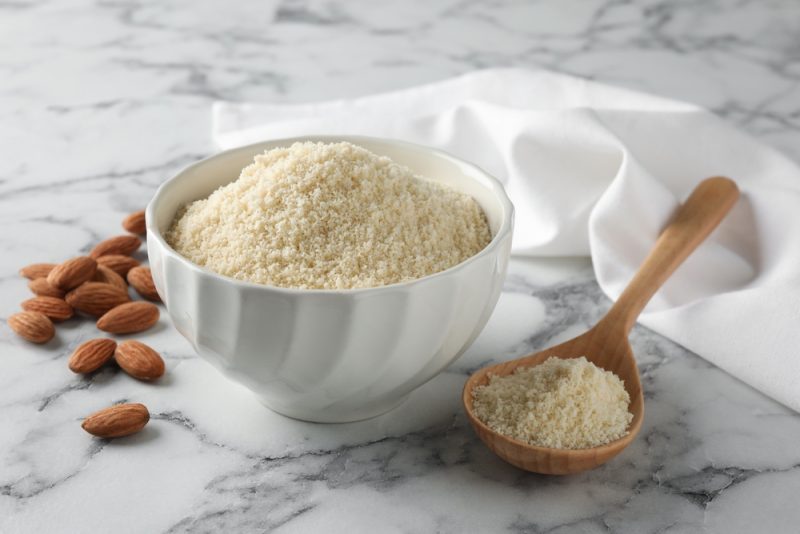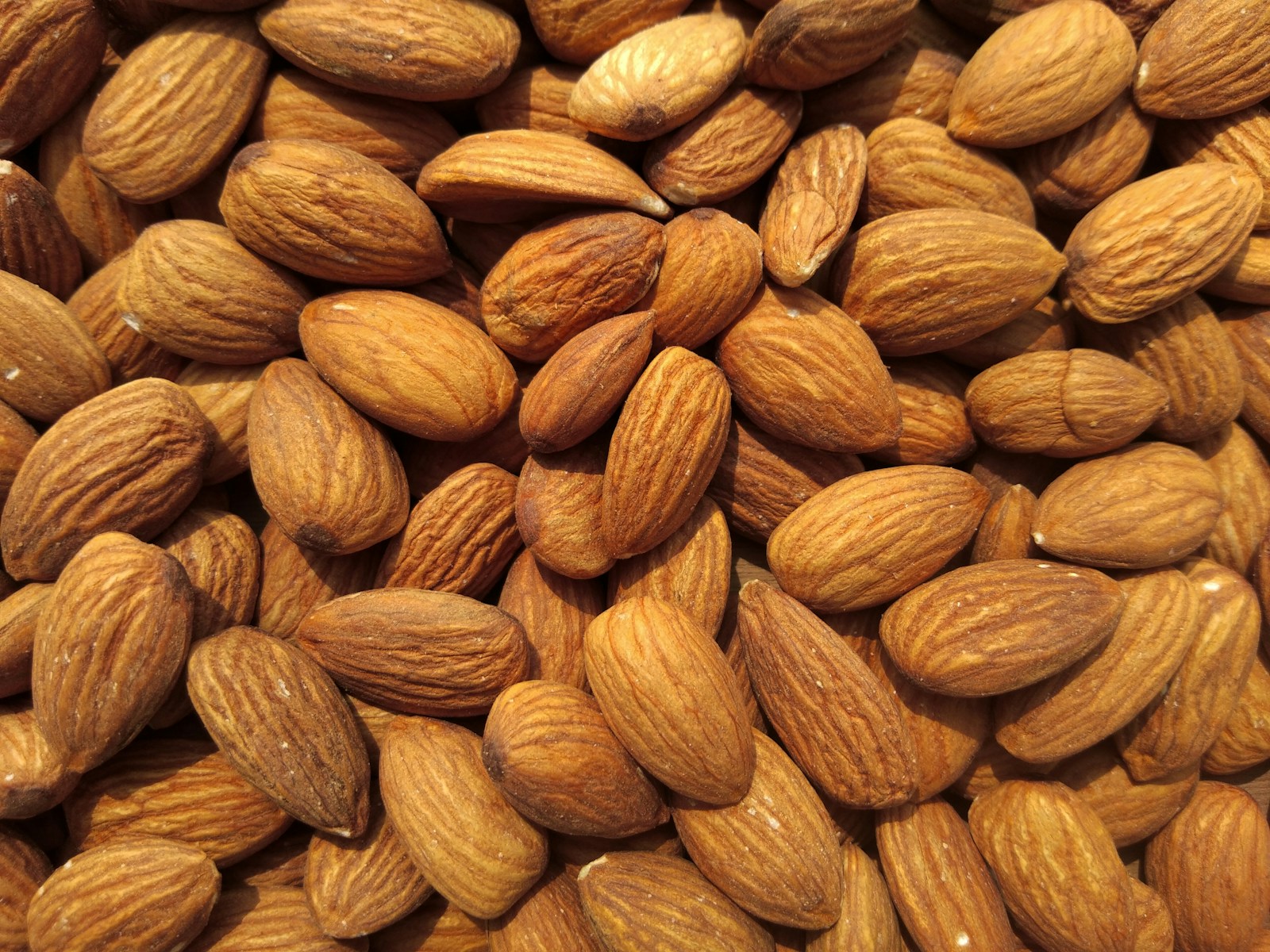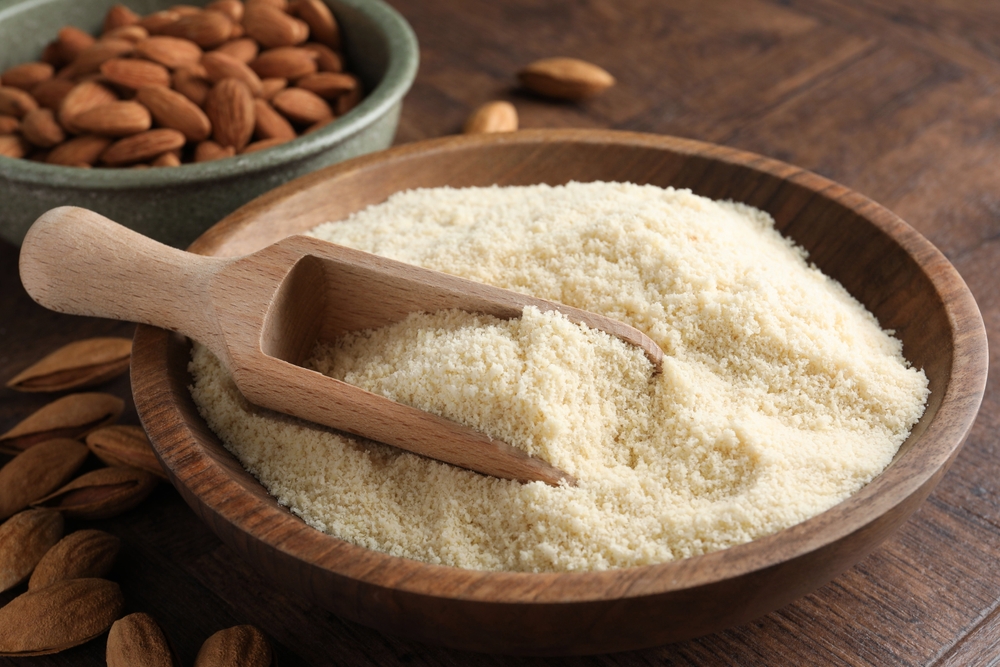[ad_1]
Almond flour is another choice to wheat flour that, in folks, is taken under consideration extra wholesome because of it has fewer carbs, accommodates a great deal of nutritional vitamins, and has a naturally sweeter style. Nonetheless, whereas almond flour isn’t toxic to canines, and it could be fed fastidiously, as an example when getting used to make healthful handmade canine treats, there are some nicely being risks associated to feeding this gluten-free completely different.
Beneath, we check out whether or not or not homeowners should feed almond flour to their canines, any nicely being benefits the ingredient presents, and as well as any risks associated to feeding it.


Can Canines Eat Almond Flour?
Almond flour is constituted of blanched almonds that are then flooring to create a unbelievable powder. It has a consistency very similar to that of corn flour, fairly than plain flour. Because of almonds do not comprise gluten, almond flour is gluten-free, and it has a naturally sweeter model than plain flour, which makes it a popular different when cooking desserts or baking sweet objects.
Although some kinds of nuts are toxic to canines, sweet almonds is not going to be. As such, they’re typically fed to canines, nevertheless solely in very small parts. Almond flour is constituted of flooring almonds so it carries the equivalent caveats. It should solely be consumed occasion and, when fed, solely given in very small parts.
Nonetheless, it could provide some benefits over plain white flour when given to your canine.


The Nicely being Benefits of Almond Flour
When given fastidiously, almond flour has some nicely being benefits to produce your canine, along with:
- Vitamin E – Vitamin E is an environment friendly antioxidant and should help promote healthful
- Phosphorus – Phosphorus combines with calcium to produce nicely being benefits to your canine. It may probably help strengthen bones, tooth, and claws, and as well as helps promote a healthful
- Magnesium – Equally, magnesium moreover helps bones and tooth. It’s normally involved throughout the carry out of enzymes and hormones.
- Protein – Canines need protein of their weight reduction plan to kind and restore muscular tissues, tendons and ligaments. The amino acids are moreover essential for immune system nicely being and the manufacturing of hormones and enzymes.
- Fiber – Canines need dietary fiber, and whereas most enterprise canine meals do comprise dietary fiber, some canines desire a weight reduction plan with bigger fiber, as helpful by their vet.
- Fewer Carbs Than Wheat Flour – Carbohydrates are an very important part of a canine’s weight reduction plan, and analysis have confirmed that canines are in a position to digesting pretty large parts of carbohydrates. Nonetheless, in case your canine is already on a high-carb weight reduction plan, there are fewer carbs in almond flour than in plain wheat
Potential Nicely being Risks
Although there are nicely being benefits to feeding small portions of almond flour to your canine, the ingredient moreover poses some precise nicely being risks:
- Power – almond flour is much bigger in vitality than wheat flour. Per 100g of flour, almond flour accommodates 570 kcal whereas wheat flour accommodates solely 340 kcal. In case your canine is overweight, almond flour shouldn’t be on the guidelines of meals they should eat.
- Pancreatitis – Extreme in fat, almond flour can energy your pancreas to work laborious with a objective to launch the enzymes needed to digest it. In some canines, this may occasionally end in pancreatitis. In case your canine is predisposed to or has suffered with pancreatitis sooner than, avoiding extreme fat meals is important.


Simple strategies to Feed Almond Flour to Your Canine
Plain almond flour is just too dry for a lot of canines to eat, so it’s going to need preparation within the occasion you do want to give it to your pup. Use it quite than wheat flour when making handmade, healthful treats in your canine.
Start with a small amount of the healthful take care of, study the safety of all completely different substances, and try to stay with straightforward recipes that solely embody pure substances. In case you uncover any indicators of gastrointestinal upset, stop feeding the almond flour immediately and in case your canine is vomiting or has diarrhea, contact a vet to get their advice.
Can Canines Eat Almonds?
Sweet almonds is not going to be toxic to canines, nevertheless they are not thought-about a protected meals to current to our canine companions. They’re extreme in vitality and fat and would possibly set off your canine to attain additional weight and will, in some situations, set off pancreatitis. In small canines, full almonds are additionally a choking or intestinal blockage hazard given the dimensions of them. In case your canine has eaten one or two almonds and isn’t displaying any indicators of choking, they’re extra prone to be unbelievable, nevertheless monitor them intently to ensure they’re passing feces normally and by no means displaying any indicators of gastrointestinal upset. In case your canine has eaten better than simply some almonds, it’s best to speak to a vet to see within the occasion that they advise inducing emesis (making your canine vomit) to cut back the hazard of pancreatitis.

Can Canines Eat Almond Butter?
Equally, almond butter is extreme in fat and accommodates numerous vitality. It might be far too rich for a lot of canines, which suggests it is extra prone to set off gastrointestinal upset. You moreover have to look at additional substances.
Can Canines Drink Almond Milk?
Almond milk has comparable caveats to each different almond meals or drinks. It might be given in very small portions, and often, nevertheless it could set off illness if fed in too large a quantity. Many almond milks moreover comprise additional substances that could be most likely harmful to canines, so you need to be additional cautious.
What Flour Is Biggest for Canines?
Almond flour is relatively protected when utilized carefully to make canine treats. In another case, your solely choice is to utilize a modest amount of full wheat or full oat flour. These is not going to be toxic and are protected to feed fastidiously.


Conclusion
Although almond flour is not toxic to canines and does provide some nicely being benefits, it is extreme in vitality and fat. As such, it should solely ever be given as a extremely occasional take care of and fed fastidiously.
Start with a extremely small amount within the occasion you’re trying to find another choice to wheat flour when making healthful canine treats. Seek for indicators of gastrointestinal upset and stop feeding in case your canine does current indicators of vomiting or diarrhea.
Featured Image Credit score rating: New Africa, Shutterstock
[ad_2]

The discussion about almond flour is quite enlightening. I never knew that it could have potential health benefits alongside risks. This gives me a lot to think about regarding my dog’s diet.
I found the insights on almond flour very informative. It’s nice to see the emphasis on moderation and health risks. I will definitely keep this in mind when making treats for my dog.
This is a well-rounded piece that sheds light on almond flour in dog treats. The mention of both nutritional benefits and possible health risks is essential for responsible pet ownership.
I appreciate how this article breaks down the pros and cons of feeding almond flour to dogs. Clear information like this helps pet owners make informed choices for their pets’ health.
This article provides a balanced view on almond flour for dogs. It’s important to consider both the benefits and risks associated with it. As a pet owner, I appreciate this thorough analysis.